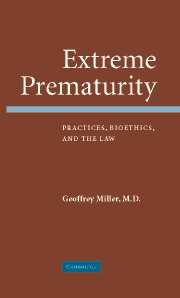Book contents
- Frontmatter
- Contents
- Part 1 THE EXTREMELY PRETERM INFANT: EPIDEMIOLOGY, PERCEPTIONS, AND PRACTICES
- Part 2 BIOETHICS
- Part 3 REPORTS, OFFICIAL OPINIONS, AND GUIDELINES
- Part 4 THE LAW
- 30 Introduction
- 31 U.S. Law
- 32 The United Kingdom
- 33 Canada
- 34 Australia
- 35 Japan
- 36 Italy, Germany, and Poland
- 37 France
- 38 The Netherlands
- Part 5 EPILOGUE: TRUTH, TRUST, AND BOUNDARIES
- References
- Index
32 - The United Kingdom
Published online by Cambridge University Press: 23 September 2009
- Frontmatter
- Contents
- Part 1 THE EXTREMELY PRETERM INFANT: EPIDEMIOLOGY, PERCEPTIONS, AND PRACTICES
- Part 2 BIOETHICS
- Part 3 REPORTS, OFFICIAL OPINIONS, AND GUIDELINES
- Part 4 THE LAW
- 30 Introduction
- 31 U.S. Law
- 32 The United Kingdom
- 33 Canada
- 34 Australia
- 35 Japan
- 36 Italy, Germany, and Poland
- 37 France
- 38 The Netherlands
- Part 5 EPILOGUE: TRUTH, TRUST, AND BOUNDARIES
- References
- Index
Summary
Although not dealing with prematurity, it is instructive to examine the R v. Arthur case,(207) as it reflects the attitudes and behaviors of many physicians and judges toward disabled children in the early 1980s and thus how they might respond to the disabled preterm infant who could be potentially mentally retarded. In the Arthur case, a Down syndrome baby was born without any clinically apparent life-threatening complication. Neither the parents nor the doctor wanted the child kept alive, and the baby was prescribed dihydrocodeine and nursing care only and in addition restricted to oral water. The baby died within about 2 days, which suggests that, in the absence of any other clinical factors, there was inordinate sedation and inadequate hydration. Although the original charge was murder, this was changed to attempted murder, as an eminent pathologist had found (not surprisingly) other congenital defects and could not discount that the baby had died of “natural causes.” Dr. Arthur was found not guilty, and one cannot discount the influence of the judge's statements, which included “any child who is a Mongol is faced with the most appalling handicap.” Although he made it clear that no doctor has the right to kill a disabled child, the situation in this case was different, he believed, as there was a “setting of conditions within which death may occur more expediently than would otherwise have been the case.”
- Type
- Chapter
- Information
- Extreme PrematurityPractices, Bioethics and the Law, pp. 160 - 167Publisher: Cambridge University PressPrint publication year: 2006
- 1
- Cited by



